Popcorn can be a tempting snack to offer to birds, but it’s important to understand if it is safe and nutritious for them. In this article, we will delve into the topic of whether wild birds can eat popcorn and explore their diet.
Key Takeaways:
- Popcorn can be safe for birds as an occasional treat.
- Plain, unseasoned popcorn without added salt or butter is the best option.
- Popcorn should not be the main source of nutrition for birds.
- Other healthier food options provide essential nutrients for birds.
- Always consider the specific dietary needs of the birds you are feeding.
The Safety of Popcorn for Birds
Popcorn is generally safe as an occasional treat for birds, but there are some considerations to keep in mind. While it is not toxic to birds, certain factors can make popcorn unsuitable for their diet.
One important factor to consider is seasoning. Popcorn that is seasoned with salt or butter should be avoided, as these additives can be harmful to birds. It’s best to offer plain, unseasoned popcorn to ensure their safety.
Another consideration is the presence of unpopped kernels. These kernels can pose a choking hazard to birds, so it’s crucial to provide only fully popped popcorn to avoid any potential issues.
The Importance of Unseasoned and Fully Popped Popcorn
- Seasoning like salt or butter can be harmful to birds
- Unpopped kernels can pose a choking hazard
- Offer plain, unseasoned popcorn to ensure their safety
By following these guidelines and providing plain, fully popped popcorn, you can safely enjoy offering this snack to the birds in your backyard.
The Nutritional Value of Popcorn for Birds
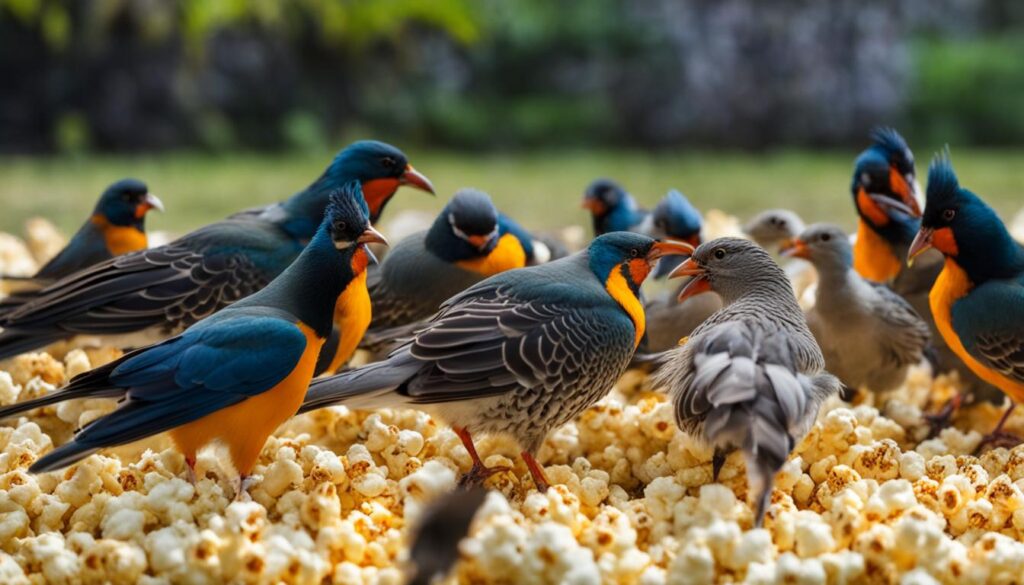
When it comes to the nutritional value of popcorn for birds, there are some key points to consider. While popcorn can provide certain benefits, it should not be the primary source of nutrition for our feathered friends.
Popcorn is primarily a source of carbohydrates, which can provide birds with energy. It also contains small amounts of protein, fiber, and minerals like magnesium and potassium. However, popcorn is low in vitamins and other essential nutrients that birds need for optimal health. Therefore, it should only be offered as an occasional snack or supplement to a well-rounded diet.
To ensure the nutritional needs of birds are being met, it’s important to provide them with a variety of foods. Alongside popcorn, consider offering high-quality bird seed mixes, sunflower seeds, millet, unsalted peanuts, and fresh fruits. These options offer a more balanced diet that provides the necessary vitamins, minerals, and nutrients for their well-being.
Benefits of Popcorn as Bird Food:
- Good source of carbohydrates for energy
- Contains small amounts of protein, fiber, magnesium, and potassium
Considerations for Popcorn as Bird Food:
- Low in vitamins and essential nutrients
- Should be supplemented with other healthier options
Remember, always consult with experts or research proper feeding guidelines to ensure the safety and well-being of wild birds. By providing a varied and nutritious diet, we can help support the health and vitality of these beautiful creatures.
Preparing Popcorn for Birds
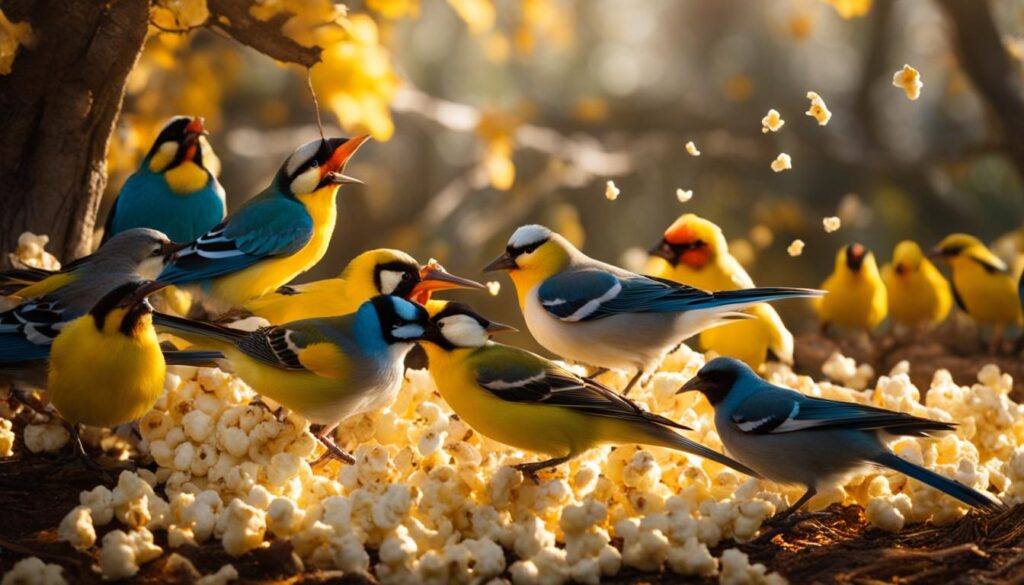
When it comes to feeding popcorn to wild birds, it’s important to take a few steps to ensure their safety and enjoyment. Here are some tips on preparing popcorn for our feathered friends:
- Choose plain, unseasoned popcorn: Birds should only be offered plain popcorn without any added salt, butter, or other additives. These seasonings can be harmful to birds and should be avoided.
- Air-pop or stove preparation: To prepare popcorn for birds, it’s best to air-pop or make it on the stove without any oil or seasoning. This ensures that the popcorn is free from unhealthy ingredients and additives.
- Cool the popcorn: After preparing the popcorn, allow it to cool completely before offering it to birds. This helps prevent any potential burns or discomfort that could result from hot popcorn.
By following these steps, we can ensure that the popcorn we provide to birds is safe and enjoyable for them to eat. As responsible bird enthusiasts, it’s important to prioritize their well-being and provide them with the best possible food.
Tips for Feeding Popcorn to Birds
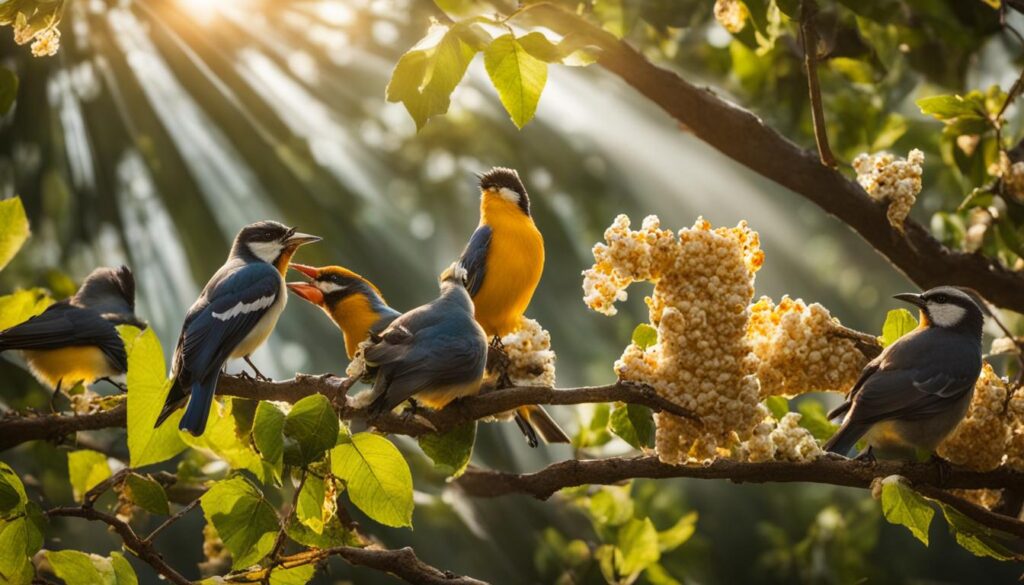
Feeding popcorn to birds can be a fun and rewarding experience, but it’s important to do it safely and responsibly. Here are some tips to keep in mind:
1. Offer small, bite-sized pieces
When offering popcorn to birds, it’s best to provide small, bite-sized pieces that are suitable for the size of the bird. Smaller birds like canaries and finches can benefit from smaller popcorn pieces, while larger birds like parrots and cockatiels can handle larger pieces. By offering appropriately sized popcorn, you can help prevent any potential choking hazards and ensure that the birds can easily consume the treat.
2. Monitor the bird while eating
While birds can enjoy eating popcorn, it’s essential to monitor them while they are consuming the treat. Watch for any signs of difficulty breathing or swallowing and ensure that the birds are not experiencing any choking or other difficulties. If you notice any issues, it’s best to remove the popcorn immediately and provide them with fresh water to help ease any discomfort.
3. Supplement with a balanced diet
Remember, popcorn should be given as a treat or supplement to a balanced diet and should not be the main source of nutrition for birds. While popcorn can provide some nutritional benefits, it lacks essential vitamins and other nutrients that birds need for overall health. Therefore, it’s important to offer a variety of other nutritious foods such as bird seed mixes, sunflower seeds, millet, unsalted peanuts, and fresh fruits. These foods offer a well-rounded diet and can ensure that the birds are getting all the necessary nutrients they require.
Feeding popcorn to birds can be a delightful way to interact with these beautiful creatures and provide them with a tasty treat. By following these tips and offering popcorn in moderation, you can help ensure the safety and well-being of the birds while enjoying their company in your backyard.
Other Considerations When Feeding Popcorn to Birds
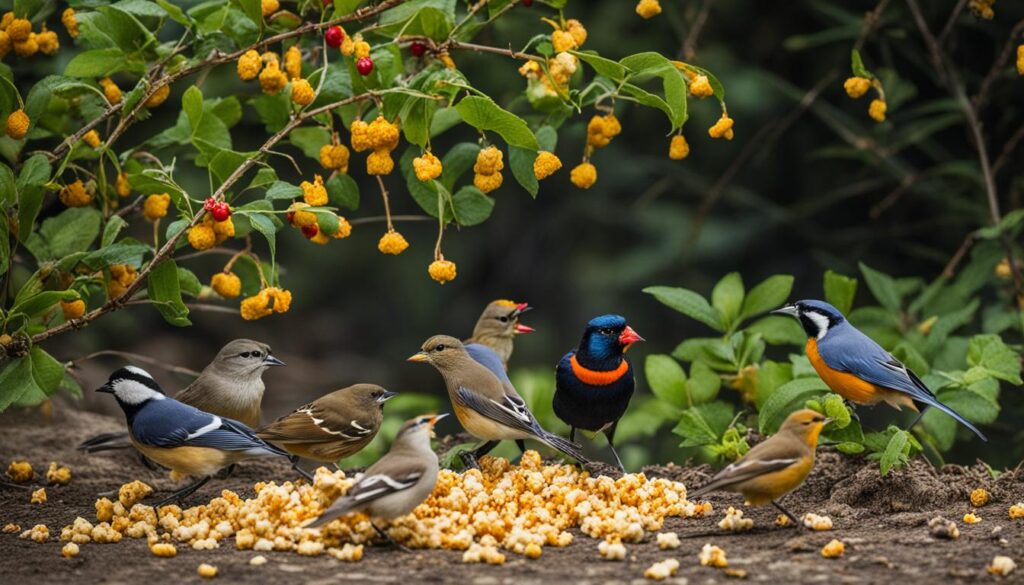
When it comes to feeding popcorn to wild birds, there are a few additional considerations to keep in mind. While plain popcorn is generally safe for most backyard birds, it’s important to remember that some birds may have allergies or sensitivities to corn, the main ingredient in popcorn. These birds may have difficulty digesting corn and may experience digestive issues if they consume popcorn. Therefore, it’s always a good idea to observe the birds’ behavior after offering popcorn and discontinue feeding it if any adverse effects are observed.
In addition to individual bird sensitivities, it’s crucial to be mindful of the specific needs of different bird species. For example, ducks and other lake birds have different dietary requirements and can actually be harmed by improper feeding, including the consumption of popcorn. It’s important to research the appropriate diet for the birds you are feeding and ensure that popcorn is not included if it is not suitable for their needs.
As with any type of bird food, moderation is key when it comes to feeding popcorn. While it can be a fun and interesting treat for birds, it should not be the sole focus of their diet. Popcorn lacks certain essential nutrients that birds need to thrive, so it should be offered as a supplement to a well-rounded diet that includes other nutritious options. By providing a variety of bird-friendly foods, you can help ensure that the birds in your backyard are getting the nourishment they need to stay healthy and vibrant.
Summary:
- Some birds may have sensitivities or allergies to corn, the main ingredient in popcorn, so it’s important to observe their behavior and discontinue feeding popcorn if any adverse effects are observed.
- Different bird species have different dietary requirements, so it’s crucial to research and understand the specific needs of the birds you are feeding before offering them popcorn.
- Popcorn should be offered in moderation and as a supplement to a balanced diet that includes other nutritious options to ensure birds receive all the essential nutrients they need.
Alternatives to Popcorn for Bird Feeding
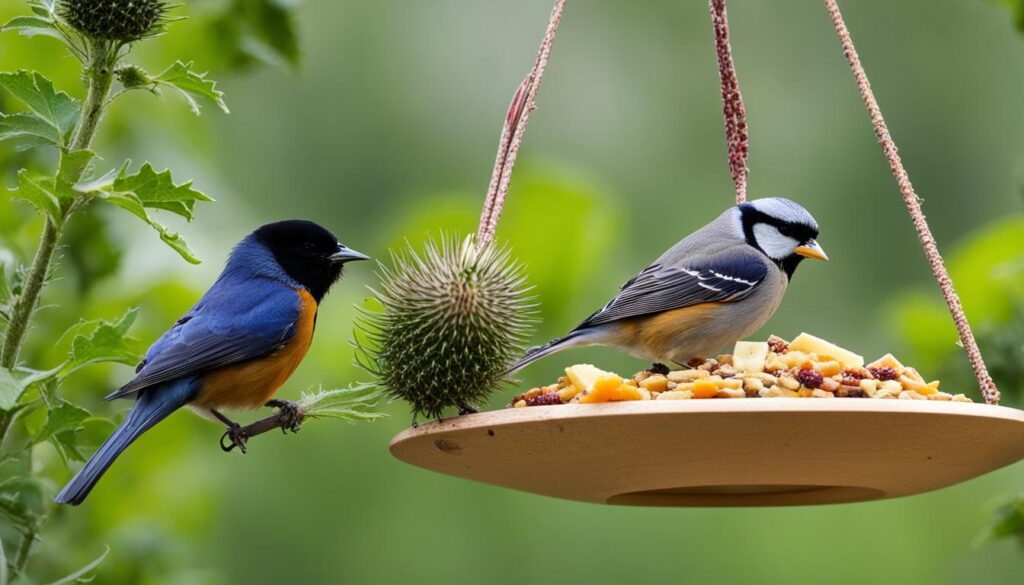
While popcorn can be offered as an occasional treat, there are other more nutritious options available for bird feeding. These alternatives not only provide essential nutrients but also cater to the specific dietary needs of wild birds. Here are some alternatives to consider:
1. High-Quality Bird Seed Mixes
High-quality bird seed mixes are designed to offer a balanced diet for birds, providing a variety of seeds that appeal to different species. Look for mixes that contain a combination of seeds like sunflower, millet, safflower, and nyjer. These blends are formulated to provide the necessary protein, fats, and carbohydrates that birds need for energy and growth.
2. Sunflower Seeds
Sunflower seeds are a popular favorite among many bird species. They are rich in healthy fats, protein, and essential nutrients. Consider offering both black oil sunflower seeds and striped sunflower seeds to attract a wider range of birds to your feeders.
3. Millet
Millet is a small, round seed that is highly appealing to ground-feeding birds like sparrows and finches. It’s an excellent source of carbohydrates and provides birds with energy. Sprinkling millet on the ground or offering it in a separate feeder can attract a diverse range of species to your backyard.
4. Fresh Fruits
In addition to seeds, fresh fruits can be a nutritious and enticing option for wild birds. Grapes, sliced oranges, and berries are all excellent choices. Remember to remove any seeds or pits from the fruits before offering them to the birds. Fruits provide essential vitamins and minerals that can supplement their diet and add variety to their feeding routine.
By incorporating these alternatives into your bird feeding routine, you can ensure that the birds visiting your backyard are receiving a well-rounded and nutritious diet. Remember to provide fresh water for drinking and bathing, as hydration is also vital for their well-being. Let’s make our feathered friends happy and healthy by offering them a diverse range of foods!
Conclusion
In conclusion, when it comes to feeding popcorn to wild birds, it’s important to exercise caution and prioritize their safety and well-being. While popcorn can be offered as an occasional treat, it should not be relied upon as their main source of nutrition. We should always remember that birds have specific dietary needs and offering them a balanced diet is essential for their health.
When providing popcorn to birds, it’s crucial to ensure that it is plain and unseasoned. Avoiding added ingredients like salt or butter is important to prevent any potential harm. While popcorn can provide some nutritional benefits, it should be supplemented with other healthier options to meet their dietary requirements properly.
Feeding popcorn to wild birds should be done responsibly and in moderation. It’s advisable to offer other more nutritious foods like high-quality bird seed mixes, millet, and fresh fruits. These alternatives provide essential nutrients and support their overall well-being.
Ultimately, the key is to understand the specific needs of the birds you are feeding. By following proper guidelines and doing thorough research, we can ensure that our feathered friends enjoy a varied and balanced diet while also keeping them safe and healthy.
FAQ
Can wild birds eat popcorn?
Yes, wild birds can eat popcorn as an occasional treat. However, there are some considerations to keep in mind to ensure their safety and well-being.
Is popcorn safe for birds?
Plain, unseasoned popcorn is generally safe for birds. However, it’s important to avoid adding salt, butter, or other seasonings that can be harmful to their health.
What nutritional value does popcorn have for birds?
Popcorn can provide birds with carbohydrates, protein, fiber, and minerals like magnesium and potassium. However, it is low in vitamins and other essential nutrients, so it should not be their primary source of nutrition.
How should popcorn be prepared for birds?
Popcorn should be plain and unseasoned. It can be air-popped or prepared on the stove without oil or seasoning. It’s important to allow the popcorn to cool before offering it to birds.
What are some tips for feeding popcorn to birds?
When offering popcorn to birds, provide small, bite-sized pieces appropriate for their size. Smaller birds can benefit from smaller popcorn pieces, while larger birds can handle larger pieces. Monitor the birds while they eat to ensure they don’t experience any difficulties.
Are there any other considerations when feeding popcorn to birds?
While plain popcorn is safe for most backyard birds, it’s important to consider any allergies or sensitivities they may have. Additionally, popcorn should not be fed to ducks and other lake birds, as they have different dietary needs.
What are some alternatives to popcorn for bird feeding?
High-quality bird seed mixes, sunflower seeds, millet, unsalted peanuts, and fresh fruits like grapes and sliced oranges are all better options for providing essential nutrients to birds.
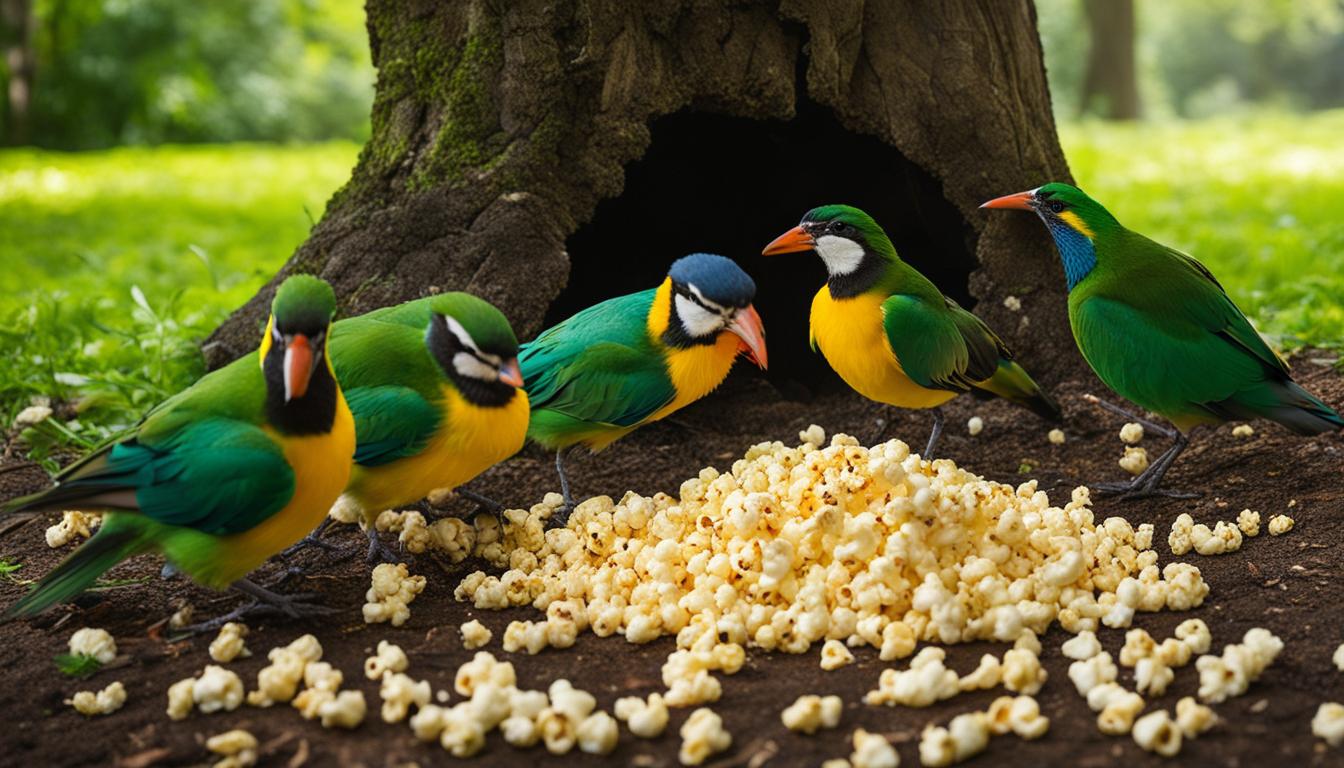
Leave a Reply